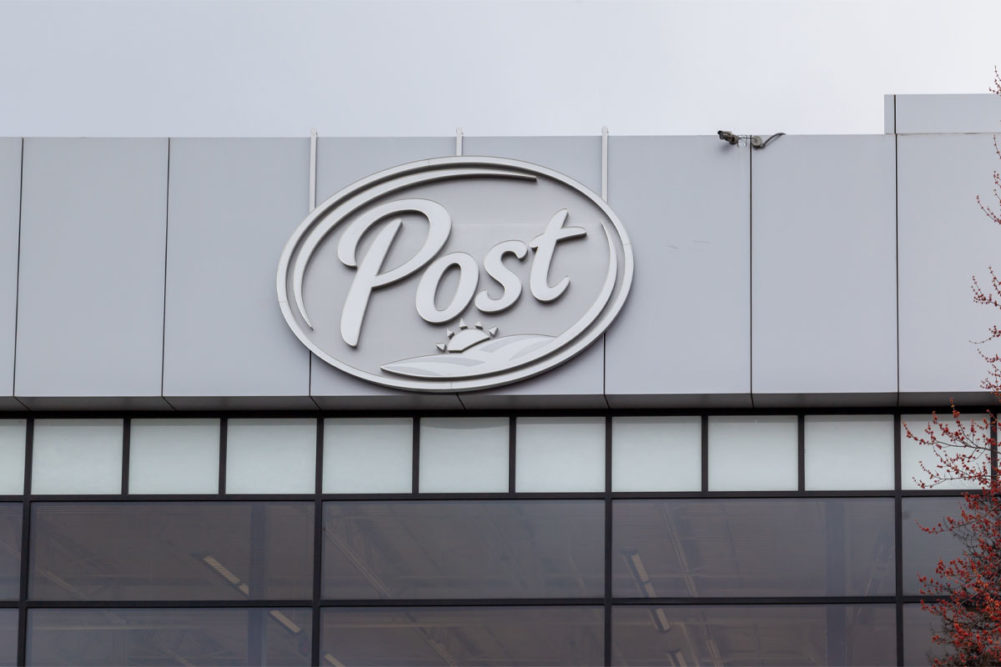ST. LOUIS — “Vastly improved” manufacturing performance and discipline in pricing and cost management helped Post Holdings, Inc. build off momentum from the back half of fiscal 2023 and kick fiscal 2024 off with a strong start, said Robert V. Vitale, president and chief executive officer.
“Our business continues to benefit from diversification in product, channel and price point,” Vitale told analysts during a Feb. 2 conference call. “As a result, our volume story is a bit more of a mixed bag. We saw volume decreases across our branded retail businesses, but Foodservice remains resilient, our value offering benefited from consumer trade down, and we saw encouraging stabilization of our Refrigerated Retail side business.”
Net income at Post Holdings in the first quarter ended Dec. 31, 2023, totaled $88.1 million, equal to $1.46 per share on the common stock, down 4% from $91.9 million, or $1.66 per share, in the same period a year ago. This year’s results included a $21.1 million expense on swaps, which compared with $12.3 million in income on swaps a year ago.
Adjusted earnings from continuing operations, meanwhile, totaled $113.7 million, which compared with $71.2 million in the same period a year ago.
Net sales in the quarter increased 26% to $1.96 billion from $1.57 billion. The most recent quarterly results included $428.9 million in net sales from acquisitions.
The strong first-quarter performance prompted Post to raise its full-year fiscal 2024 adjusted EBITDA to $1.29 billion to $1.34 billion, up from an earlier forecast of $1.22 billion to $1.28 billion.
Segment profit in the Post Consumer Brands business totaled $132.7 million, up 67% from $79.3 million a year ago. Net sales rose 78% to $988.6 million from $554.7 million.
Jeff A. Zadoks, executive vice president and chief operating officer, said both pet food and grocery had a strong quarter within the Post Consumer Brands unit.
“Pet food exceeded our expectations as strong manufacturing performance supported growth in our value brands, and we saw encouraging signs of stabilization in our premium brands,” Zadoks said. “We began making the investments in this business that we spoke about last quarter. However, some costs ramped up slower than we expected.
“For grocery, the main profit drivers were carryover pricing and strong cost performance, which enabled us to recover some gross margin loss or inflation. US cereal category dynamics remained relatively unchanged with volumes down 5%, although the rate of category volume declined, moderated late in the quarter. Our expectation remains that the category will return to its pre-pandemic volume trends as we lap the pullback in SNAP benefits in March.
“From a dollar share perspective, we were pleased to hold share versus prior year, ending the quarter at 19.1%. From a network and supply chain perspective, we are focused on optimizing our cereal manufacturing network. Similarly, for pet, we are working on optimization as we prepare to come off the contract manufacturing agreement with Smucker's and integrate Perfection Pet into our network.”
A slight decrease was noted in Post’s Foodservice unit, where segment profit fell 4% to $75.7 million from $79.3 million. Net sales also were lower in the segment, falling to $567.1 million from $600.5 million a year ago.
Zadoks said Foodservice results were driven by continued volume growth, especially in Post’s higher-margin precooked egg products. He also said the company began selling ready-to-drink shakes to BellRing in January.
Segment profit in the Weetabix business was $21 million, down 2.4% from $21.5 million. Sales increased, though, rising to $129.1 million from $118.1 million. On Dec. 1, Post completed its acquisition of Deeside Cereals I Ltd. from Wholebake Ltd. Deeside Cereals makes breakfast cereals and cereal bars for UK-based food retailers. Vitale said that while the acquisition of Deeside was small, it gives Weetabix some plant capacity that it needs for some specific private label product in the UK.
In the Refrigerated Retail segment, profit climbed 70% to $35.6 million from $21 million while sales fell 4% to $280.9 million.
Looking ahead, Post said it expects fiscal 2023 capital expenditures to range between $420 million to $445 million, which includes Foodservice investment in the expansion of the company’s Norwalk, Iowa, precooked egg facility and the start of phase two expansion of the Bloomfield, Neb., cage-free egg facility, for an aggregate of $100 million to $110 million. The outlook also includes $90 million to $100 million for Pet Food quality, safety, capacity, pilot plant and distribution network investments, and approximately $20 million related to thescheduled closing of the company’s Lancaster, Ohio, cereal manufacturing plant.





